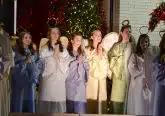Summoned to Love with W.H. Auden’s “For the Time Being”
Among the rich and wonderful mysteries of the Incarnation is the intersection of time by eternity. Or perhaps the better formulation is that the Incarnation introduces a different kind of time from the chronological time by which we order our hours, days, weeks, months and years. This everyday account of time as “duration,” even when we do not fully understand it, is the reliably predictable way that we make plans, consider contingencies and remember past events. We use phrases such as, “You can set your watch by” such-and- such an event, by which we mean that it is foreseeable and stable. This expectedness is comforting. We like the predictability, and even satisfaction, that time-as-chronology brings to our lives.
The Incarnation of Christ—eternal God becoming chronological man—upsets this comfortable contentment. It jolts us out of the ease of foreseeability. The Incarnation affronts both our understanding of time as duration and the complacency that comes with a sense of certainty.
This is the case because Jesus did not merely bring God to Earth. Rather, He brought a new way of considering time, itself. In contrast to time as Chronos, Christ introduces us to time as Kairos. Kairos is a Greek word from which we derive our word “crisis” and “critical.” Kairos is not time as duration, but rather as an unmeasurable, intrusive moment. This new accounting of time is not characterized by numbers and duration. Rather, Kairos is a moment that overwhelms time as chronology and forces us to make a critical decision.
In Christ, this new kind of time absorbs chronology into itself. It is an immeasurable “point” in which Kairos transcends and engulfs Chronos. The Kairos of the Incarnation is the “time” that contains all chronological time in itself as one mysterious, yet timeless, event. In one of the central mysterious paradoxes of Christian faith, by entering chronological time as the God-Man, Christ brings “eternal” time to us. The Incarnation is the timeless redemption of time.
This is the underlying theme of W.H. Auden’s great Christmas poem, “For the Time Being,” written over a period of months in 1941 and 1942 and first published in 1944. The timing of this long, difficult poem is essential to understanding it. Auden had recently returned to the Christian faith of his youth and suffered the death of his mother, whom he revered. A madman was waging war across Europe, threatening not just nations but civilization itself. The U.S., from which British-born Auden wrote “For the Time Being,” had recently entered the war. In this chronological time of great personal and geo-political upheaval, Auden penned his only expressly Christian poem, celebrating the critical time of God becoming man. Along with “The Age of Anxiety” (for which Auden won the 1948 Pulitzer Prize), “For the Time Being” is one of Auden’s greatest poems.
In the section of “For the Time Being” called “The Summons,” Auden contrasts the wicked chronological time of idolatrous earthly politics with the time-redeeming crisis of the Incarnation. Over seven stanzas of this section, a “fugal chorus” intones the greatness of Caesar, each stanza concluding with, “Great is Caesar: God must be with Him,” after extolling the accomplishments of worldly power. From propaganda to science and economics to military might, Caesar keeps the trains running on time and a chicken in every pot.
But after these encomiums to temporal pleasures and convenience, the poem’s narrator challenges the finality of these fleeting goods. “We know very well that we are not unlucky but evil,/ That the dream of a Perfect State or No State at all,/ is a part of our punishment.” Auden is criticizing both utopian and anarchic visions of politics, representing the gamut of worldly political theories. We have put our trust in chronological princes, and the princes have let us down. We have made idols of the times, and the times are fleeting and inconstant.
To this moment of realization comes the Incarnate Christ— the King to whom all temporal Caesars must bow in humble obeisance. Christ confronts us with the critical moment of decision, by which we recognize that our salvation comes in the fullness of Kairos, in both transcending and absorbing Chronos:
Let us therefore be contrite but without anxiety,
For Powers and Times are not gods but mortal gifts from God;
Let us acknowledge our defeats but without despair, For all societies and epochs are transient details, Transmitting an everlasting opportunity
That the Kingdom of Heaven may come, not in our present And not in our future, but in the Fullness of Time.
Let us pray.
“When the fullness of time had come,” explains St. Paul in Galatians 4:4, “God sent his Son, born of a woman, born under the law, to ransom those under the law, so that we might receive adoption.” In the Incarnation Chronos is fulfilled by Kairos. Christmas is the eternal crisis by which we are summoned from our temporal complacence.
 Dr. Kenneth Craycraft holds the James J. Gardner Chair of Moral Theology at Mount St. Mary’s Seminary & School of Theology. He is the author of Citizens Yet Strangers: Living Authentically Catholic in a Divided America (OSV 2024).
Dr. Kenneth Craycraft holds the James J. Gardner Chair of Moral Theology at Mount St. Mary’s Seminary & School of Theology. He is the author of Citizens Yet Strangers: Living Authentically Catholic in a Divided America (OSV 2024).
This article appeared in the December 2024 edition of The Catholic Telegraph Magazine. For your complimentary subscription, clickhere.














